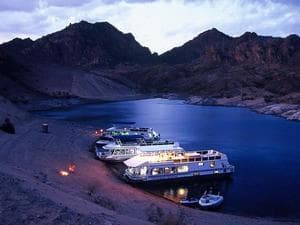Houseboat Safety 101
- Author
- Heather
- Category
- How To
Houseboat Safety 101
Houseboating is an exciting adventure, but the safety of you and your group is paramount.
Operating a boat is a serious responsibility. Review these tips and those in your confirmations before your trip and make sure to discuss with your group to ensure a safe and fun vacation.

Engine Safety
Make sure everyone is out of the water before starting the engine, and always have a spotter on the back deck while moving in reverse.
Only swim when the engine is off and the houseboat is secured.
Be aware of the generator. Carbon monoxide can build up and become dangerous if it's run too long. Swimmers must be at least 30 feet away from the boat if the generators are running.
Never jump or slide into the water without knowing how deep it is.

Life Jackets
Houseboats come equipped with basic safety jackets (not water sport jackets) for emergency use. Check to make sure you have one for everyone aboard the houseboat before you depart the marina.
We highly recommend bringing fitted life jackets for children especially, as the marina may not have the correct size available upon arrival.
It is also recommended that children who are not confident swimmers wear life jackets at all times when outside of the houseboat cabin, and while it's in motion.
In Case of High Winds or Stormy Weather
If you notice storm clouds, a sudden temperature drop, or wind speed increasing, play it safe and get off the water.
If driving, turn your bow (front of boat) into the wind for better control. Find a protected cove asap, and wait it out.
The marina will understand if you're late in returning the boat. Use the marine radio onboard if you need assistance.

Anchoring
Never leave the helm unmanned until the houseboat is secured.
Water levels can fluctuate; examine lines each morning and evening to ensure they're taut.
Anchoring can look different by location: most houseboats on lakes moor to the shoreline with stakes or land anchors, some tie off to trees/boulders or buoys. Houseboats on riverways may have anchors that go into the water, or can dock along canalways.
Read our guest blog How to Anchor a Houseboat for tons of handy info!
First Aid
Bring a first aid kit with you if you're able, though most houseboats have basic kits.
Know the location of the houseboat's Fire Extinguisher and carbon monoxide detector
Don't forget the sunscreen, and drink plenty of water. Know the signs of heat illnesses.

Use Good Judgment
Don't operate while impared
Have emergency radio channels or phone numbers in a place where everyone can see them.
The marina staff will lead you through an orientation when you arrive, but it's important to have a general knowledge of boating safety before you step foot on the dock. There are several boating safety exams and certifications online:
The key to having the best vacation ever is ensuring a safe one.



